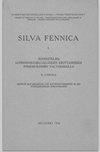Incorporating tree- and stand-level information on crown base height into multivariate forest management inventories based on airborne laser scanning
IF 1.7
3区 农林科学
Q2 FORESTRY
引用次数: 16
Abstract
This study examines the alternatives to include crown base height (CBH) predictions in operational forest inventories based on airborne laser scanning (ALS) data. We studied 265 field sample plots in a strongly pine-dominated area in northeastern Finland. The CBH prediction alternatives used area-based metrics of sparse ALS data to produce this attribute by means of: 1) Tree-level imputation based on the k-nearest neighbor (k-nn) method and full field-measured tree lists including CBH observations as reference data; 2) Tree-level mixed-effects model (LME) prediction based on tree diameter (DBH) and height and ALS metrics as predictors of the models; 3) Plot-level prediction based on analyzing the computational geometry and topology of the ALS point clouds; and 4) Plot-level regression analysis using average CBH observations of the plots for model fitting. The results showed that all of the methods predicted CBH with an accuracy of 1–1.5 m. The plot-level regression model was the most accurate alternative, although alternatives producing tree-level information may be more interesting for inventories aiming at forest management planning. For this purpose, k-nn approach is promising and it only requires that field measurements of CBH is added to the tree lists used as reference data. Alternatively, the LME-approach produced good results especially in the case of dominant trees.基于机载激光扫描的多变量森林经营清单中树木和林分树冠基高信息的整合
本研究探讨了在基于机载激光扫描(ALS)数据的森林资源清查中包括树冠基部高度(CBH)预测的替代方案。我们在芬兰东北部松林密集的地区研究了265个样地。CBH预测方案利用稀疏ALS数据的基于面积的度量来产生该属性,方法包括:1)基于k-近邻(k-nn)方法的树级插值,以CBH观测作为参考数据的全现场测量树列表;2)以树径、树高和ALS指标为预测因子的树级混合效应模型(LME)预测;3)基于ALS点云计算几何和拓扑分析的图级预测;4)利用小区平均CBH观测值进行小区水平回归分析,进行模型拟合。结果表明,所有方法预测CBH的精度均在1 ~ 1.5 m之间。样地水平回归模型是最准确的替代方法,虽然产生树木水平信息的替代方法对于以森林管理规划为目标的清查可能更有意义。为此,k-nn方法很有前途,它只需要将CBH的现场测量值添加到用作参考数据的树列表中。另外,lme方法产生了很好的结果,特别是在优势树的情况下。
本文章由计算机程序翻译,如有差异,请以英文原文为准。
求助全文
约1分钟内获得全文
求助全文
来源期刊

Silva Fennica
农林科学-林学
CiteScore
3.50
自引率
11.10%
发文量
21
审稿时长
3 months
期刊介绍:
Silva Fennica publishes significant new knowledge on forest sciences. The scope covers research on forestry and forest ecosystems. Silva Fennica aims to increase understanding on forest ecosystems, and sustainable use and conservation of forest resources. Use of forest resources includes all aspects of forestry containing biomass-based and non-timber products, economic and social factors etc.
 求助内容:
求助内容: 应助结果提醒方式:
应助结果提醒方式:


